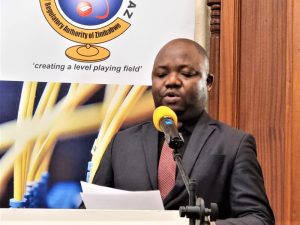- Have any questions?
- +263 719 632 817
- editor@easterntimeszim.org
ICT Parliamentary Portfolio Committee slams Finance Ministry, RBZ

Transport and Infrastructure Development Portfolio Committee speaks against tenderprenuership, bogus road constructors
May 9, 2022
Dave Munos Foundation challenges African indigenous philanthropists to step-up
May 27, 2022ICT Parliamentary Portfolio Committee slams Finance Ministry, RBZ

The deputy chairperson of the ICT Parliamentary Portfolio Committee Honourable Ability Gandawa (with microphone) speaks out candidly during the two-days stakeholders engagement workshop organised by POTRAZ in Vumba that ended yesterday (Tuesday).
Ngoni Dapira
THE Parliamentary Portfolio Committee on Information Communication Technology (ICT), Postal and Courier Services has slammed the Ministry of Finance and Economic Development for not turning up at a landmark ICT stakeholders engagement workshop organized by the Postal and Telecommunication Regulatory Authority of Zimbabwe (POTRAZ).
The two-days stakeholders engagement workshop held from Monday to yesterday (Tuesday) at Leopard Rock Hotel in Vumba, Mutare, ran under the theme, “Ensuring operator viability and service affordability- The balancing act challenges.”
The ICT Parliamentary Portfolio Committee was very outright about its disappointment on the non-attendance of the Finance Ministry which was supposed to present on the fiscal policy perspective on enhancing ICT service affordability as a key enabler for the digital economy in line with the National Development Strategy 1 (NDS1).
The deputy chairperson of the ICT Parliamentary Portfolio Committee, Honourable Ability Gandawa was the first to express his displeasure towards one of the representatives from the Reserve Bank Government (RBZ), after he failed to respond on a direct question on why most ICT operators were failing to access foreign currency from the foreign currency auction system. The RBZ representative had said he would need to get back on that issue after taking note of the concerns raised by the operators.
The acting permanent secretary in the Ministry of ICT, Postal and Courier Services Dr Beulah Chirume had prior that also highlighted that each day she was being inundated with requests she would send to the RBZ on behalf of the operators, concerning foreign currency auction system applications which were being rejected. “Issues around ICT infrastructure upgrades and maintenance are very crucial in the telecoms sector in order to provide quality service but this needs foreign currency. I am glad RBZ is here and they will iron out some of these issues,” said Dr Chirume, sparking a fire to the debate that latter followed.
Hon Gandawa did not mince his words about his dissatisfaction. “You came on behalf of the RBZ driving from Harare all the way for this important workshop. With the importance we are attaching on the data must fall issue, then the RBZ says it cannot answer? It’s worrisome. We expected more because this is the first multi stakeholder meeting of its kind. We want to come out of this workshop with recommendations and roadmaps on how and when we will see data falling and ICT operators getting reasonable access to forex from the auction system, but the RBZ is shocking us. This is really bad,” said the Hurungwe North legislator Hon Gandawa, to the applause of many who supported his interjection.
Another legislator part of the ICT portfolio committee added, “You can not tell us you will get back to us on such an issue because when you came here you very well knew that this would be one of the major issues on discussion given the nature of the programme on discussion. We cannot condone such disregard and lack of prioritization for national issues by the RBZ.”

Hon Moyo
The ICT Parliamentary Portfolio Committee chairperson Hon Peter Moyo in a sideline interview yesterday after the workshop said it is no longer the time for talk-shops especially when such strategic engagement workshops are convened. He also accused the Finance Ministry of negating their (ICT Ministry) budgetary recommendations yet ICT has become a key economic enabler, especially in the wake of the ongoing covid-19 pandemic.
“You see, we will not go anywhere with such attitudes, especially from the Ministry of Finance. We have called them on several occasions for our meetings especially concerning the E-governce drive that the President (Mnangagwa) wants to be a success in his vision 2030. With the ongoung covid-19 pandemic, internet connectivity was revealed to be a necessity, but to our surprise the Budget presented in Parliament was not the one presented by our Ministry. It was a drop in the ocean, so it won’t work,” said Hon Moyo.
Adding,” Even several crucial recommendations that we are making to the Finance Ministry as well as to the Executive in our oversight role as a portfolio committee, we always have to impose ourselves to persuade influential individuals in the Executive to plead on our behalf, but that is not how things should be done. When reports are presented to the Executive, lets discuss openly and honestly what is workable and best for the nation and implement it,” said the ICT Parliamentary Portfolio Committee chairperson.
The complaint by the ICT Parliamentary Portfolio Committee comes in the backdrop of complaints raised against graft by the Portfolio Committee on Transport and Infrastructure Development last month after its countrywide field visits of roads and bridges infrastructure projects. While year in, year out several portfolio committees seem to be submitting condemning and comprehensive reports to the Executive, including supporting reports of gross corruption and graft from the Office of the Auditor-General Mildred Chiri, the executive nonetheless seems to be turning a blind eye on critical issues pointed out to help turn around the economy.
Hon Moyo said he hopes to see a difference this time around after they present their roadmap from the POTRAZ stakeholder engagement workshop. He said from the resolutions of the workshop, the consensus was to push for win-win strategies to ensure data affordability for the consumers and viability for the operators.
“Internet access is an enabler of all the fundamental rights hence a necessity…There is need to strike a balance between business and enjoyment of human rights. We will then come up with a report with our findings, observations and recommendations. The report will be presented before the August House,” he said.
Adding, “The committee will also further engage the Local Government Ministry, ICT Ministry and ZIMRA (Zimbabwe Revenue Authority) on the issues related to taxes, specific to the telecommunications industry, as well as access to foreign currency for infrastructure development and other consumables, to ensure that the sector is cushioned on various economic challenges caused by the current economic environment.”
He said the committee will respectively also engage the Ministry of ICT and Ministry of Local Government concerning improved services at Community Information Centres and for the standardization of levies charged on telecoms operators by the local authorities.

ICT deputy Minister Phuti
The deputy Minister of ICT, Postal and Courier Services Dr Dingumuzi Phuti in his official welcome remarks on Monday echoed that in the current digital era, ICTs have become the new oil that enables the growth of all other sectors. He also stressed the need for collaborative efforts to improve internet penetration, particularly in rural areas.
“The desire to balance service affordability while maintaining operator viability is crucial. The deliberations here are designed to provide the ICT stakeholders an in – depth understanding of supply side, demand side, endogenous as well as exogenous factors that affect service affordability and operator viability,” said the deputy ICT Minister.
He added that the role of ICTs in fostering socio-economic transformation cannot be underestimated given President Emmerson Mnangagwa’s upper middle – income economy vision by 2030.
“We have already achieved milestones towards universalization of mobile and broadband services access. The mobile penetration rate now stands at 94.4%, while the internet penetration rate stands at 63.1%, and it is our hope that we will reach 100% internet penetration rate before 2030.”
The ICT deputy Minister however said to achieve the goal of universality, issues of service affordability and business sustainability become critical. “Hence the need for this workshop to unpack factors that work for or against the desire to balance affordability and business sustainability,” said Dr Phuti.


